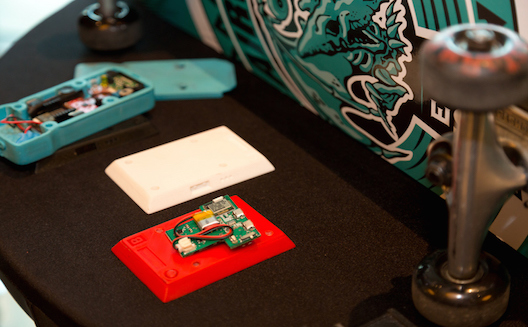Skateboarding gets a wearable

Wearables, especially those for fitness and healthcare, are getting a lot of attention, from athletes looking to improve their performance through to creative hackers and makers.
Now add Jibin Jose and Abimanyu Nair, the Indian cofounders of Flip Technologies, to the list.
The company’s first product, RideBlock, is a sensor that bolts to the underside of a skateboard between the board and truck, and transmits data about the skater’s tricks to a smartphone app.

The RideBlock replaces the plastic riser that bolts between the
board and truck. (Images via Pamela Kesrouani)
Simple beginnings
"It all started a year ago," Jose says. "We were attending the same college, and we were very interested in the startup ecosystem in India."
"We decided to design a hardware product after graduation, and we discovered our mutual love for skateboarding, a sport that is not very popular in India. We also saw that everybody uses fitness wearables designed to track steps and performance, but we didn't find such a device for skateboarding, so we decided to build RideBlock."
Jose (CEO) and Nair (CTO) eventually joined the accelerator Flat6Labs Abu Dhabi, where they were introduced to entrepreneurs and mentors from around the globe.
What is RideBlock exactly?
It took the partners six months to produce their first prototype. That prototype was funded by an angel investor in India, and later by Flat6Labs.
The RideBlock sensor is bolted between the board and the skateboard truck in place of a conventional plastic riser.
"The sensor is connected to a mobile app and relays information concerning the jumps and overall performance of the skater," Jose says. "Skaters can share and compare their performance with others using the same app, thereby encouraging each other. In other words, it is a Fitbit for skateboard lovers.”
The RideBlock is designed to be both shock absorbent and water resistant, and costs $79. It will be manufactured in China, and the app is available for Android and iOS platforms.
"When we first came to Abu Dhabi, our target customers were in North America and Europe, as these places have the highest number of skateboarders,” Jose says. “However, we found out that there are many amateur skaters in Abu Dhabi along with a skatepark and three groups of skateboarders. They will be the first to try our products."
"(The UAE) is the best place to test a device because it is home to people from all over the world, which allows us to receive diverse feedback,” he continues. “It is also a great location for expansion."

Jibin Jose pitches RideBlock at Flat6Labs Abu Dhabi's
graduation.
To promote their product, the founders will launch a Kickstarter campaign in a few months with special incentives for those who agree to test the product. This will allow Jose and Nair to adjust the product for a period of six months before they officially launch RideBlock in Europe.
"Building 10 prototypes is a very difficult and costly process,” Jose says. “If you want to update software, you can just change a few lines in the code, while if you make a mistake while building a hardware product, you have to start all over from zero."
Of course, this is aside from the funding challenges, where investors seem to be more skeptical in hardware early-stage startups.
The skateboarding hardware market is still a fertile untapped one, where RideBlock's only competitors are companies that design snowboards and surfboards. However, Jose pointed out that the Rideblock was designed to be adapted to different, larger markets.
"The overall value of costs spent at skiing and skateboarding activities in Europe is $10 billion,” Jose says. “Meanwhile, the overall size and cost of all amateur players in this kind of extreme sports is estimated to be $17 billion in Europe and North America, compared to (only) $2 million in the MENA region."
These are numbers that certainly push Jose and his partner to expand, especially considering that the platform is ready. All they have to do, he says, is to adapt the exploratory devices and add a certain feature to the app.
Jose and Nair have no intention of leaving the UAE at the moment. Yet they are open to the prospect of relocating to a country that is closer to their target markets, where both funding and target customers are more accessible. Indeed, Jose is very optimistic about the whole athletics sector, which seems keen on emerging tech and appears to be limitless.


